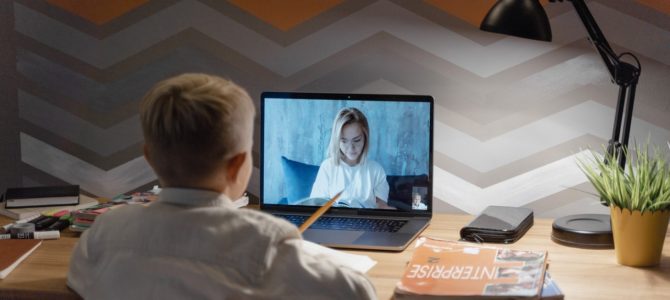Experts warned lawmakers that virtual learning and the consequences of government-mandated lockdowns exacerbated the problems that the nation’s youngest generation face when it comes to digital devices and media.
During the “Kids Online During COVID: Child Safety in an Increasingly Digital Age” hearing hosted by the House Subcommittee on Consumer Protection and Commerce of the Committee on Energy and Commerce on Thursday, various experts testified that virtual schooling contributed to the growing problems associated with excessive screen time and isolation.
“Even pre-pandemic, young people were spending increasing amounts of time on devices and online. And in the past year, it has felt like all of life has moved online: virtual playdates, ballet and soccer class, music lessons, and storytimes; video calls and online games with grandparents; remote school,” Ariel Fox Johnson, Senior Counsel and Global Policy at Common Sense Media told the subcommittee.
“All of this was the reality we faced long before a global pandemic forced all of us to migrate much of our lives online. It is therefore essential that we address not just the issues of the moment but also the broader structural issues with the digital ecosystem that the pandemic has simply laid bare,” Dr. Nusheen Ameenuddin, Chair of the Council on Communications and Media at the American Academy of Pediatrics and one of the hearing witnesses said.
In addition to increasing mental health issues and suicides, most representatives and witnesses alike agreed that keeping kids at home glued to a screen posed an imminent threat to their mental health, academic growth, and social skills. Director of School Choice at the Reason Foundation, Corey A. DeAngelis, one of the witnesses, noted that forcing students to learn virtually has a significantly disproportionate impact on low-income, working families and results in higher amounts of screen time.
“This is leading to inequity,” DeAngelis said. “This is hitting the least advantaged in the community the hardest, particularly because the most advantaged have access to in-person alternatives or good versions of remote virtual learning at home or even have more ability to cover the costs associated with home-based education.”
Other concerns in the hearing were focused on big tech companies’ exploitation of addictive and sometimes inappropriate features such as likes, engagement, scrolling, autoplay, and engineering to encourage kids to stay attached or even sometimes dependent on digital devices, isolating them and depriving them of the social interactions that are required for their mental health and growth.
“They can’t step away because the next video is already starting and, as has been mentioned here, that video was tailor-made often to appeal to them,” Fox Johnson said. “There are a variety of ways that social media companies right now are using as design tactics to keep kids hooked.”
Some of the proposed solutions include expanding the current “Children’s Online Privacy Protection Rule” (COPPA) to apply to children under 18 years old, tightening up the rule’s current limits on targeting advertising and allocating the Federal Trade Commission more money to put towards enforcing the policy.
Other witnesses noted that both privacy and Big Tech’s manipulation of certain features to gather personal data from underage persons should be a focus in the reform.
“Children should have the right to do what they wish and to learn and to grow without being surveilled and monitored at every step of the way,” Fox Johnson said.









